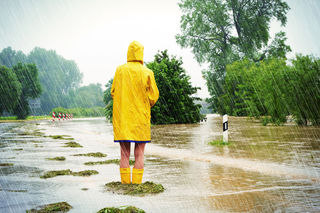Health
Rising Temperatures Could Worsen Mental Health
A large study highlights the psychological risks of climate change.
Posted November 8, 2018

Hotter temperatures, more frequent hurricanes, and added precipitation are all associated with an increased prevalence of mental health challenges in the U.S., a recent study finds—and experts warn that the problem is likely to get worse as the climate continues to warm.
Using data provided by a randomly selected sample of more than two million U.S. residents in the years from 2002 to 2012, the study found that an increase in average maximum temperatures of 1 degree Celsius over a five-year period was associated with a 2 percentage point increase in the prevalence of self-reported mental health issues. Average monthly highs that shifted from below 30 degrees Celsius (about 86 degrees Fahrenheit) to above that mark corresponded with a half-a-percentage point increase in the probability of self-reported mental health challenges in those locations. That increase was more pronounced for low-income respondents, particularly low-income women.
If the link is causal, then across the entire U.S. population, the authors write, that increase would translate to almost 2 million additional people experiencing poor mental health in months with average temperatures above 30 degrees Celsius—which are projected to occur with greater frequency across large swaths of the country each year.
A wetter climate also appeared to exacerbate mental health problems. Months with more than 25 days of precipitation were associated with a 2 percentage point increase in the probability of reported stress and depression relative to months with fewer wet days. Exposure to Hurricane Katrina, the most significant hurricane during the period captured in the data, was linked to a 4 percentage point increase in mental health problems.
The mental health data came from the CDC’s Behavioral Risk Factor Surveillance System survey, which asked participants to assess how often their mental health—specifically with regard to stress, depression, or “problems with emotions”—had been “not good” over the previous 30 days. This data was cross-referenced with climate data from PRISM Climate Group at Oregon State University as well as other sources.
Given the scientific consensus that the planet is warming—and a recent report by the U.N.’s Intergovernmental Panel on Climate Change predicting global temperatures will increase 1.5 degrees Celsius by 2040—“it’s fairly clear that we should be concerned about the effect of climate change on mental health,” says lead author Nick Obradovich, a political scientist who researches the societal impact of climate change at the MIT Media Lab.
The study, published in the Proceedings of the National Academy of Sciences, relies on data from the largest behavioral health survey in the world. Still, it was not the first to link a hotter climate to mental health. Obradovich’s own work has found associations between increased nighttime temperatures and poorer sleep quality, and a study published in Nature Climate Change earlier this year found that in both the U.S. and Mexico, increased temperatures were closely associated with higher rates of suicide. “That’s further evidence that we should be concerned for other countries as well,” he adds.
The observational nature of the study means that any causal link between climate change and mental health couldn’t be firmly established—and even if researchers could prove a causal connection, it’s still not understood exactly how it might result. Exposure to hurricanes, which often comes with loss of property or physical health challenges, have effects that could be easily linked to mental health challenges, Obradovich says. But the connections between higher temperatures and poor mental health are likely more complex.
He speculates that the connection could have something to do with sleep. “When it’s hotter outside, people don’t sleep as well,” he says. “Repeated sleep deficiencies tend to produce all kinds of mental health problems—that could be the thing that’s driving all this.” Increased temperatures have also been tied to decreased work productivity, he says, which could be related to feelings of depression or anxiety. Further research that teases out potential causes is important, he adds, as it could help policymakers create more targeted interventions.
“If you’re a policymaker and you’re concerned about making society more resilient to climate change, you’d like to be able to treat the problems at their source,” focusing on specific ways in which climate change might cause mental health issues downstream, he says. “But I don’t think policymakers will go wrong in any way by just improving the quality and availability of mental healthcare in this country.” If the U.S. were to adopt carbon taxation—a long-proposed measure for reducing global warming—some of the revenue could be used to fund mental health and sleep hygiene programs, he adds.
Ashlee Cunsolo, a health researcher at Memorial University who studies climate change and mental health among Canada’s Indigenous populations and Australian farmers, says the results resemble what she’s seen in her own work.
“These same concerns are coming up [among Inuits and Australian farmers], albeit in a different context,” she says. In addition to a greater prevalence of stress and depression, her work has also identified increased rates of suicide and suicidal ideation and more cases of drug and alcohol abuse in areas hit hard by climate change—including Australia’s drought-racked farming regions and Inuit villages where seal-hunting and other deep-rooted cultural practices have been devastated by melting sea ice.
Studies like this are important for tracking what the Intergovernmental Panel on Climate Change has termed “intangible loss and damage,” she notes. “Policy makers used to look at loss from an economic perspective,” she says. “But in many cases, the loss that people experience is going to be intangible”—like their sense of home and safety or their overall well-being.
“When you’re talking about people hurting or grieving, that’s harder for people to get their minds around” than environmental or economic loss, she says. “And your policy response needs to be very different.” Community-building programs that help people connect with others—or learn strategies for fighting climate change on a personal scale, like cutting down on meat consumption or using public transit whenever possible—can help reduce feelings of powerlessness in the face of the unknown, she suggests.
Additional training for clinicians is also a path forward, says psychiatrist Grant Brenner, and would ideally start with better identification of weather- and climate-related mental health issues. Education initiatives could be aimed at the general public as well. “Everyone knows that the weather affects your mood,” Brenner says. “But when people are provided with data,” as well as specific coping strategies to address climate-related mental health changes directly, “it makes them more active.” Coping strategies could include standard anxiety remedies like mindfulness or cognitive behavioral therapy, as well as climate-specific strategies like spending time in a cool area when heat-related mental health risks run especially high. “If you feel prepared for the weather, it’s less likely to cause anxiety," he says, "and that’s a part of active coping and resilience.”

Disaster-related mental health challenges require their own unique solutions, Brenner says, like identifying community leaders in vulnerable locations—before disasters strike—and training them in psychological first aid. “You would train citizens, as well as professionals, to be available for response teams,” he says. “They would be trained to understand how to interact with people in an acute disaster setting,” he says, by using specific research-backed strategies (known collectively as risk communication) to build trust between authority figures and impacted communities and provide information to allow victims to make informed health decisions. “It’s very different from when a patient comes into your office for therapy.” Psychological first aid was first developed by the National Center for Post-Traumatic Stress Disorder and is designed to reduce the likelihood that people in impacted communities will develop mental health problems later on.
Whatever the response, Cunsolo says, it’s critical that it be implemented as quickly as possible. “Often when I’m talking to policymakers, [they want] 20 years of empirical data to see what we’re dealing with,” she adds. “We don’t have 20 years to waste.”
Facebook image: Elizaveta Galitckaia/Shutterstock




